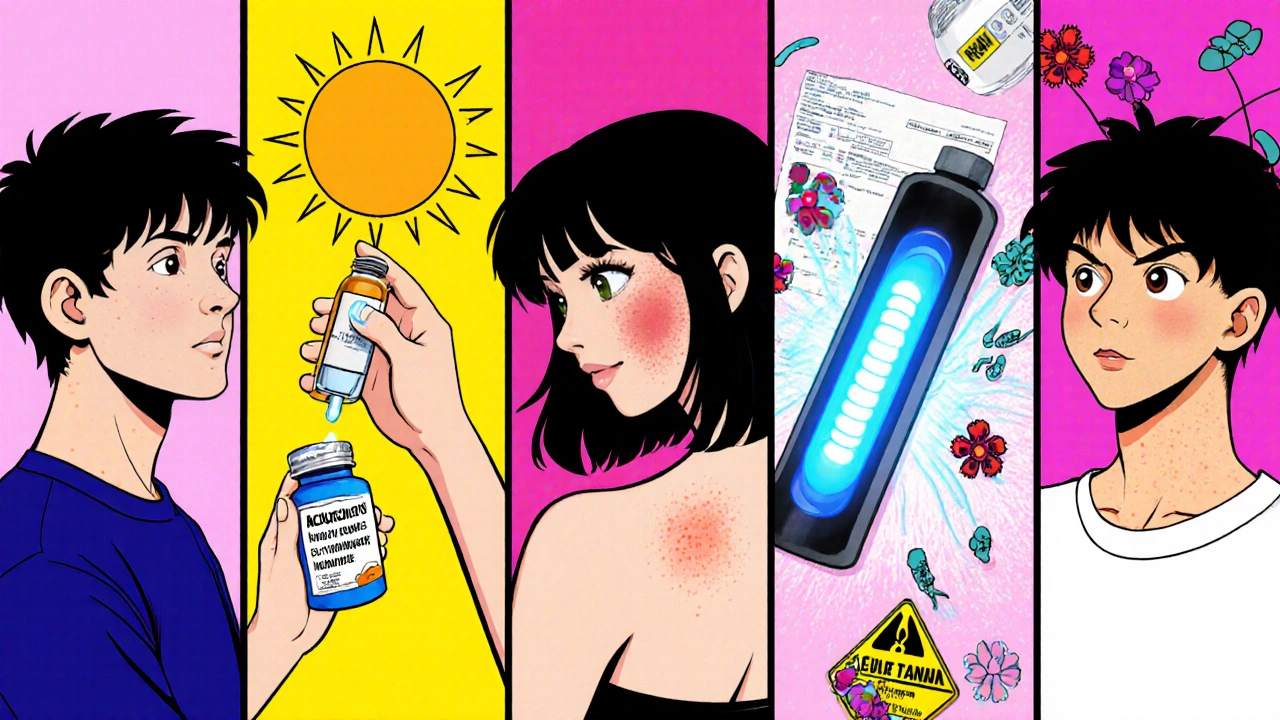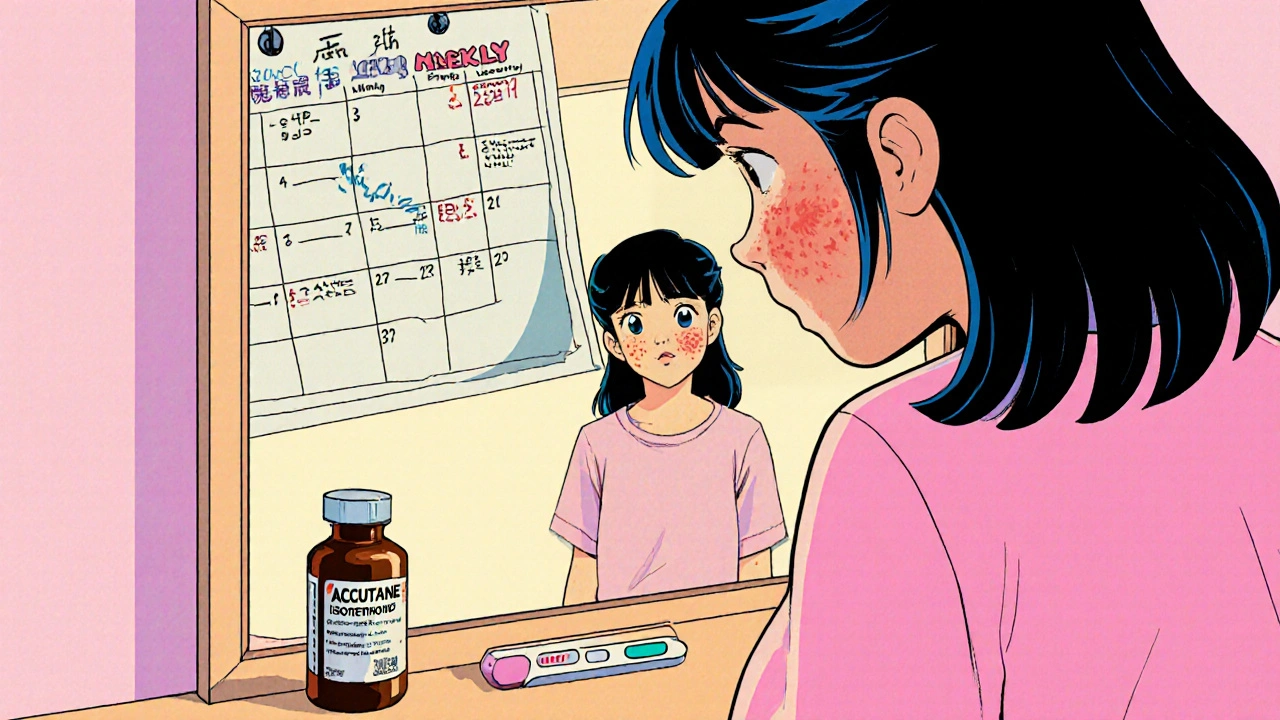Acne Treatment Selection Guide
Select Your Situation
Answer these questions to find the best acne treatment option for your needs.
Select your answers to get your personalized treatment recommendation.
When severe acne refuses to clear up with over‑the‑counter solutions, many turn to Accutane a high‑dose oral retinoid (isotretinoin) prescribed for nodular and cystic acne. It’s a game‑changer, but it’s also a commitment: strict monitoring, pregnancy restrictions, and a raft of possible side effects. If you’re weighing whether to start Accutane or explore another route, you need a side‑by‑side view of the most common alternatives.
Key Takeaways
- Accutane delivers the highest cure rates for severe acne but requires intense medical supervision.
- Oral antibiotics such as Doxycycline a tetracycline antibiotic that reduces inflammation and bacterial load are cheaper and safer for short‑term use, yet they rarely eradicate acne fully.
- Topical retinoids (Tretinoin the acidic form of vitamin A applied daily to the skin and Adapalene a newer synthetic retinoid with lower irritation risk) work well for mild‑to‑moderate cases and have minimal systemic impact.
- Hormonal therapy, especially Spironolactone an anti‑androgen that reduces sebum production in women, can clear hormonal acne but only benefits female patients.
- Light‑based options (e.g., blue‑light phototherapy) are safe, non‑invasive, and useful for inflammatory lesions, yet they often need multiple sessions and can be pricey.
Comparison Matrix: Accutane vs. Common Alternatives
| Criteria | Accutane (Isotretinoin) | Oral Antibiotics (Doxycycline) | Topical Retinoids (Tretinoin, Adapalene) | Hormonal Therapy (Spironolactone) | Light Therapy (Blue Light) |
|---|---|---|---|---|---|
| Typical Efficacy | 70-90% long‑term clearance | 30-50% moderate improvement | 20-40% reduction in comedones | 40-60% improvement in hormonal lesions | 15-30% reduction in inflammatory lesions |
| Treatment Duration | 4-6 months (cumulative 120-150 mg/kg) | 3-6 months (continuous) | 6-12 months (daily) | 6-12 months (continuous) | 6-12 weeks (2-3 sessions/week) |
| Major Side Effects | Dry skin, cheilitis, teratogenicity, mood changes, liver enzyme elevation | Photosensitivity, gastrointestinal upset, microbial resistance | Skin irritation, erythema, dryness | Hyperkalemia, menstrual irregularities, fatigue | Transient redness, rare eye irritation |
| Pregnancy Risk | Highly teratogenic - strict iPLEDGE program | Generally safe, but doxycycline contraindicated in pregnancy | Safe in pregnancy (category C) - consult physician | Contraindicated - teratogenic potential | Safe - no systemic exposure |
| Cost (US$ per month) | ≈ $300-$500 (depends on dose) | ≈ $20-$60 | ≈ $30-$80 | ≈ $40-$100 | ≈ $150-$250 (clinical sessions) |
| Monitoring Required | Blood tests (liver, lipids) every 4-6 weeks, monthly pregnancy test | None for short courses; occasional liver panel if prolonged | None systemic; skin tolerance checks | Serum potassium every 3 months | None beyond session assessment |
How Accutane Works (and Why It’s Powerful)
Accutane belongs to the retinoid family and targets the root causes of severe acne: excess sebum, follicular hyperkeratinisation, bacterial overgrowth, and inflammation. By binding to retinoic acid receptors (RAR‑β and RAR‑γ) in skin cells, it shrinks sebaceous glands, normalises skin cell turnover, and reduces *Propionibacterium acnes* colonisation. The result is fewer clogged pores and a dramatic drop in inflammatory lesions. Because it works systemically, even deep cysts that never surface can be addressed.
Oral Antibiotics: Doxycycline and Its Role
Doxycycline a broad‑spectrum tetracycline that inhibits bacterial protein synthesis and has anti‑inflammatory properties is the most prescribed antibiotic for moderate to severe acne. It reduces *P. acnes* numbers and calms redness, but it doesn’t target sebum production. Resistance can develop after 3-4 months, which is why clinicians limit use to 3-6 months and pair it with topical agents. Side effects are usually mild-sunburn‑type reactions, upset stomach, and occasional yeast overgrowth.

Topical Retinoids: Tretinoin and Adapalene
Topical retinoids work locally, delivering the same cellular‑level push as Accutane but without systemic exposure. Tretinoin the acidic form of vitamin A applied in cream or gel, first approved for acne in the 1970s is highly effective for comedonal acne but can cause peeling and irritation, especially at higher concentrations. Adapalene a newer synthetic retinoid that is less irritating and stable in sunlight is now available over‑the‑counter in many markets. Both require patience-visible improvement often takes 8-12 weeks, and consistent nightly use is key.
Hormonal Therapy: Spironolactone for Women
Female patients with hormonal acne-typically manifesting on the jawline, chin, and lower face-benefit from anti‑androgen treatment. Spironolactone a potassium‑sparing diuretic that blocks androgen receptors, reducing sebum output is used off‑label for this purpose. It’s taken orally once or twice daily, and many women notice a smoother complexion within 2-3 months. The drug is contraindicated in pregnancy, so reliable contraception is mandatory. Regular blood tests for potassium and kidney function are advised.
Light‑Based Options: Blue‑Light Phototherapy
Blue‑light devices emit wavelengths (415 nm) that target the porphyrins produced by *P. acnes*, generating reactive oxygen species that kill the bacteria. The treatment is painless, requires no systemic drug intake, and can be performed in‑office or at home with FDA‑cleared devices. However, each session only reduces the bacterial load temporarily; for lasting results, clinicians often combine light therapy with topical benzoyl peroxide or retinoids. The cost per session can add up, and insurance coverage is rare.
Decision Guide: Which Option Fits Your Situation?
- Severe nodular/cystic acne, no pregnancy plans, and willingness for close monitoring? Accutane is the most definitive.
- Moderate inflammatory acne, need a short‑term solution, or want to avoid systemic retinoids? Doxycycline (or minocycline) plus a topical retinoid works well.
- Mild comedonal acne, skin‑type concerns, or desire a non‑prescription route? Start with Adapalene 0.1% gel daily.
- Female‑specific hormonal flare‑ups, especially around menstrual cycles? Discuss Spironolactone with your dermatologist.
- Preference for non‑drug methods, fear of side effects, or looking for adjunctive therapy? Try blue‑light sessions combined with benzoyl peroxide.
Always involve a board‑certified dermatologist early. Blood work, pregnancy testing, and discussion of lifestyle factors (smoking, alcohol, vitamin A intake) can prevent complications.
Pros and Cons Summary
- Accutane: Highest cure rate, long‑lasting results, but high cost, teratogenic risk, and mandatory lab checks.
- Doxycycline: Affordable, fast anti‑inflammatory effect, but resistance risk and limited use in pregnancy.
- Topical Retinoids: Low systemic risk, good for maintenance, but slower visible results and possible skin irritation.
- Spironolactone: Targets hormonal acne effectively, safe for most women, but not for men or pregnant patients.
- Blue‑Light Therapy: Non‑invasive, safe for all ages, but requires multiple sessions and higher per‑session cost.
Frequently Asked Questions
Can I take Accutane if I’m on birth control?
Yes, but you must use two forms of reliable contraception because Accutane is highly teratogenic. Most dermatologists require a negative pregnancy test before each prescription refill.
How long after finishing Accutane will my skin stay clear?
A majority of patients remain clear for years, especially if they maintain a gentle skincare routine. Relapses can happen, and a short course of topical retinoids may be recommended as maintenance.
Is it safe to combine Accutane with topical benzoyl peroxide?
Yes, many dermatologists prescribe benzoyl peroxide alongside Accutane to reduce bacterial resistance and speed up acne clearance. Start with a low concentration to minimise irritation.
What are the warning signs of severe side effects on Accutane?
Persistent joint pain, severe mood changes, rapid weight gain, or a sudden rise in liver enzymes should be reported immediately. Regular blood tests help catch problems early.
Can I use isotretinoin if I have a history of depression?
The link between isotretinoin and mood disorders is debated. If you have a personal or family history of depression, discuss it with your dermatologist; careful monitoring is essential.
Choosing the right acne treatment isn’t a one‑size‑fits‑all decision. By comparing efficacy, duration, side‑effect profiles, cost, and monitoring needs, you can pick a path that fits your skin, lifestyle, and medical situation. Keep this guide handy, talk openly with a dermatologist, and remember that consistency-whether you’re on Accutane or a gentle retinoid-often makes the biggest difference.


Comments (9)
Rachael Turner October 22 2025
Reading through the guide reminds me how acne can shape more than just skin it can affect confidence. The way the author laid out the pros and cons feels like a map for anyone lost in the fog. I appreciate the reminder that each path needs patience and self‑compassion.
Tiffany Davis October 29 2025
I found the side‑by‑side tables especially helpful. The balanced view lets readers compare efficacy and cost without feeling pushed toward any single option.
Bret Toadabush November 5 2025
They don’t tell you how big the pharma lobby is behind Accutane. All that monitoring is just a way to keep us dependent on their clinics. If you look deeper the side effects are downplayed to sell more of the next drug.
Diane Thurman November 11 2025
Honestly most of these alternatives are overhyped. Doxycycline can’t clear a real cystic breakout and the cheap retinoids often cause more irritation than benefit.
Iris Joy November 18 2025
Choosing a treatment is never just about numbers on a chart, it's a personal journey. First, understand how your skin reacts to hormonal shifts, because that can dictate whether a drug like spironolactone will be effective. If you have severe cystic lesions that keep resurfacing, isotretinoin remains the gold standard despite its monitoring demands. However, the commitment to regular blood work and pregnancy testing should be weighed against your lifestyle and support system. For many, a combination approach works best-start with a short course of doxycycline to calm inflammation. Add a gentle topical retinoid such as adapalene at night to keep pores clear. When you finish the antibiotics, keep the retinoid on board for maintenance; this can prevent rebound flare‑ups. If you are a woman with persistent jaw‑line breakouts, discuss spironolactone with your dermatologist and set up potassium monitoring. Blue‑light therapy can be a useful adjunct, especially if you are wary of systemic meds, but remember it often requires multiple sessions and the results are modest. Cost is another factor; isotretinoin can feel pricey, yet the long‑term remission it offers may offset years of cheaper but less effective treatments. Always keep a consistent skincare routine-gentle cleanser, non‑comedogenic moisturizer, and sunscreen. Avoid harsh scrubs that can damage the barrier and worsen irritation, particularly when you are on retinoids. Nutrition plays a subtle role; omega‑3 fatty acids and a balanced diet may help reduce overall inflammation. If mood changes arise on isotretinoin, reach out to your provider immediately; mental health monitoring is as important as liver panels. In the end, the best plan is the one you can stick to, with the guidance of a qualified dermatologist who respects your concerns.
Sarah Riley November 25 2025
From a pharmacodynamic perspective isotretinoin modulates sebaceous gland apoptosis, yielding a superior clearance index.
Tim Blümel December 2 2025
Deep dive indeed 🌊. Your step‑by‑step breakdown resonates – consistency truly beats quick fixes. Keep pushing forward 🚀.
Joanne Ponnappa December 8 2025
Good overview, very clear and easy to follow 👍.
Michael Vandiver December 15 2025
Thanks for the info 🙌